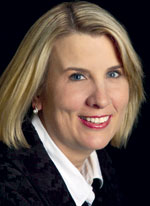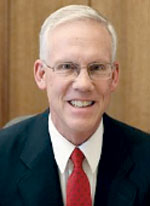The race to see who will become the latest judicial addition to the Flathead County District Court comes down to two experienced, local judges: Kalispell Municipal Judge Heidi Ulbricht and Justice of the Peace David Ortley.
In 2009, the state Legislature approved the creation of three new district judge positions. Flathead County, due to its high caseload volume, received one of those positions, bringing the county’s total to four.
District Court is the county’s trial court of record, with jurisdiction over civil and criminal cases. The judges serve six-year terms. Ortley and Ulbricht both believe they would be assets to this court and help relieve the heavy caseload and provide a fair perspective from a new bench.

Heidi Ulbricht
As the Kalispell municipal judge for the past 16 years, Ulbricht believes this election is a “golden opportunity” to take her career to the next level.
Ulbricht grew up in Boise and completed her undergraduate education at the University of Washington. After law school at the University of Idaho, Ulbricht took a law clerk position with a district judge in Boise.
“That’s when I realized I wanted to be a judge,” she said.
When she moved to Kalispell after two years of practicing with a law firm specializing in insurance defense, Ulbricht worked for a sole practitioner, largely dealing with real estate and contractual law.
She was elected to the municipal judgeship in 1994, where she said she is proud of implementing the DUI and Drug Court, as well as the Domestic Violence Accountability Court.
These options offer more effective treatment for offenders, Ulbricht said.
“I don’t necessarily bring cookie-cutter justice,” Ulbricht said.
Ulbricht believes one of her biggest strengths as a judge is her ability to maintain her caseload without backlog. With a background in accounting, Ulbricht said she works efficiently and effectively to make sure her cases are dealt with in a timely manner.
Her oldest case, she said, is from two weeks ago.
“The strongest aspect that I bring is the pace that I do cases,” Ulbricht said.
Having presided over 150 or so jury trials at the municipal level, Ulbricht said she is familiar with the district court procedure and could make the transition seamlessly.
“I believe I would be able to take the bench and start hearing cases immediately,” Ulbricht said.
If elected, Ulbricht said she would bring her penchant for technology to the District Court level. Shifting to an e-court system would remove the need for paper documentation, and would save time and money, she said.
This would ideally carry over to another of her goals, which is a file-sharing collaboration with emergency law enforcement. Both agencies – the court and law enforcement – could access case files from either side electronically, which Ulbricht said would also save time.
Currently, Ulbricht said she regularly uses mobile alcohol monitoring technology for second and third DUI offenders, as well as vehicle interlock systems.
As a district judge, Ulbricht said she would try to implement a DUI and Drug Court at the district level, adding that she already has the appropriate network in place to do so and it would not be expensive.
One of the starkest differences between her current seat and the District Court seat is the shift in administrative duties. As a municipal judge, Ulbricht oversees the office, whereas the district level has the clerk of court to ensure things run smoothly.
Moving up to the district level would allow her to focus more on judicial responsibilities, something she said most judges hope for.
“You get to really use your skills, while here it’s like running a small business,” Ulbricht said.

David Ortley
This year’s election is a potential pinnacle for Ortley after a decade of preparation and training with an eye on the District Court bench.
With a bachelor’s degree in law enforcement from the Minnesota State University and a law degree from Hamline University School of Law, Ortley left private legal practice in Kalispell to take a new step in his career.
“I made the decision that I wanted to spend the second half of my career in the judiciary,” Ortley said.
In 1999, Ortley went after an open District Court seat along with Stewart Stadler. When Stadler earned the position, Ortley was appointed as justice of the peace, and finished out Stadler’s term to be re-elected in 2002 and 2006.
Ortley said the transition to justice of the peace was an excellent training ground for an eventual higher office. It’s a job he has taken to heart, he said.
“The 11 years I’ve been here, I’ve taken one vacation. I take my job very, very seriously,” Ortley said. “I care; I care a lot. I’m here everyday, five days a week. I am the go-to judge in this court.”
His experience as a lawyer who worked District Court cases for 13 years and now as a judge would make for a smooth transition, Ortley said.
While he says he does have a case backlog, Ortley asserts it is nearly impossible to do his job well without having one. Backlog is either a function of case volume or a judge not doing the work, he said.
Ortley noted that Flathead County District Court is one of the busiest in the state, with an average of 55 new cases opening everyday. Last year, Justice Court saw over 17,600 cases filed, over 4,400 of which were civil matters.
“This is why you have backlog – because you drink from a fire hose,” Ortley said.
With every hour of every day scheduled, Ortley said any research he needs to do on a case has to happen at night or on weekends. Most people who appear before him do not have attorneys, and bring piles of information to sort through.
“This is the people’s court,” Ortley said. “It’s their day in court and they deserve your attention; they want to know they got a fair shake.”
It’s a sentiment he said he fully embraces, and one he would like to see expanded at the district level. Fewer people can afford legal representation these days, he said, and more are using self-help legal resources.
This makes the court system more accessible to the public, he said, which is how it should be.
“It is their court system, it is not ours,” Ortley said.
Ortley noted it would be tough to start any new District Court programs at this time due to budget constraints, and any changes would need the support of all the judges to happen.
Since he is running for the Department 4 seat, Ortley could not simultaneously try to keep his justice of the peace seat, which is also up for election this year. It’s an all or nothing opportunity he believes he is ready for, Ortley said.
“I’m all in,” he said.
The general election is Nov. 2. Absentee ballots are available until noon on Nov. 1.